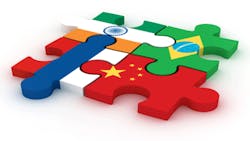Dynamic Operations Can Help Minimize Volatility in Emerging Markets
To anyone with low-cost manufacturing operations in emerging markets, the early 2014 headlines might have been a bit unsettling.
“Investors Flee Developing Countries” … “Currencies in Many Emerging Markets Take a Pounding, Hit by Growth Fears,” wrote The Wall Street Journal. Surely, this was not what manufacturers had in mind when they set up locations to take advantage of nascent growth in developing markets.
In reality, of course, these headlines should come as no surprise. The emerging market environment is much more dynamic than the traditional market environment, and the global marketplace has changed since the birth of supply chain management.
Trade flows in emerging regions can be extraordinarily complex, crossing borders with significant differences in labor market efficiencies, infrastructure sophistication, ease of doing business, and tax structure. Population patterns can add more complexity. Countries such as Brazil, Russia and Mexico, for example, have large urban populations, while in the Asia-Pacific region, more people live in rural areas than in cities, although urban populations have grown rapidly.
Although there is volatility in developed countries, these challenges can be amplified in emerging markets. Regulations, for instance, can be unclear and change quickly, making compliance with import/export restrictions complex. And, in certain parts of the world, the risk of political upheaval is ever-present, creating further potential for global supply chain disruption.
A standardized, cost-driven supply chain cannot address all of these complexities. Rather, companies may want to establish a web of multiple, agile supply chains that can work together. And, as they are tailored to specific regions and supported by local capability and talent, companies have the opportunity to create the flexibility they want to achieve dynamic responses to market changes.
Such dynamic operations can give companies the ability to rapidly respond to high volatility while building economic value. Dynamic operations are built on four key capabilities, each coming into play in emerging markets.
1. Insight to Action: Assimilating internal and external business data into decisive, speedy and appropriate responses and understanding diverse, fragmented customer groups. This entails the ability to sense, capture and analyze external and internal data and turn it into business intelligence that can help overcome pressing emerging market challenges.
Turning insights into action also can help supply chain operations in emerging markets where data is disparate and supply chain players are often disconnected. Technology and data management can provide timely alerts of changes in product consumption, with data used by internal and external partners to quickly update replenishment plans.
2. Adaptable Structure: Designing the operating model and underlying operations infrastructure to help capitalize on new opportunities and respond to threats and downturns. In emerging markets, adaptable structures play a major role in reaching rural markets, where incomes are growing and consumers are buying discretionary goods and lifestyle products such as mobile phones and television sets.
Businesses need extensive and flexible distribution networks to serve such markets. An alliance with a local partner, for example, might bring local knowledge, infrastructure, supply chain scale, and a strong sales and distribution network to the outside partner’s strong brand, global reputation and industry expertise.
3. Flexible Innovation: Innovating for growth and operational efficiency. In the past, many companies viewed emerging markets simply as new terrain for existing products. Success in these markets, however, oftentimes requires redesigning products to meet unique needs.
For example, customers in rural areas may lack the financial means or storage space to purchase large quantities of a specific product. Consumer products companies have created small shampoo sachets that customers can purchase once a day, while automobile makers in emerging markets have designed small “urban compact” sport utility vehicles combining fuel economy with SUV features.
4. Agile Execution: Adjusting quickly to volatility and capturing opportunities. With fragmented markets, long distribution chains, consumer diversity and poor infrastructure, companies frequently find that they need to be able to adjust their supply chains quickly. Agile execution creates tight information links between supply chain partners, helping reduce order cycle times while streamlining processes.
The agile execution concept includes clear definition of accountabilities within the supply chain to help everyone know who is responsible for what as situations change. Lenovo, for example, uses a hybrid supply chain model employing advanced segmentation and analytics to help reduce costs and improve delivery performance. The company has been able to create flexible operations and execute with increasing speed by keeping part of its production in-house.
Companies that are successful in emerging markets are creating agility as they partner with suppliers to reduce costs and improve asset utilization. They are also mindful of the need for skilled supply chain talent—a core element of agility—and may offer a wider range of career and development opportunities than their competitors.
Emerging markets are home to 85% of the world’s population and represent vast growth potential for ambitious companies. Companies doing business in emerging markets, however, will soon run up against the limits of traditional supply chain optimization techniques. Dynamic operations offer a way to capitalize on new opportunities and respond quickly and effectively to threats and disruptions.
Stephane Crosnier is a managing director in Accenture Strategy, Operations. Accenture is a global management consulting, technology services and outsourcing company.
